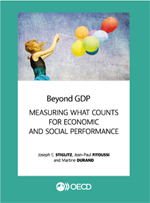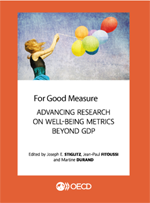Centre on Well-being, Inclusion, Sustainability and Equal Opportunity (WISE)
Measurement of Economic Performance and Social Progress
The High-Level Expert Group on the Measurement of Economic Performance and Social Progress (HLEG), attached to the OECD, was established in 2013 to follow-up on the recommendations of the Commission on the Measurement of Economic Performance and Social Progress (also known as the Stiglitz-Sen-Fitoussi Commission) and to provide impetus and guidance to the various initiatives currently ongoing on measuring people’s well-being and societies’ progress.
The HLEG covered four substantive areas in the field of measuring economic performance and social progress:
> Income and Wealth Inequality
> Multidimensional and Global Inequalities
> Multidimensional Subjective Well-Being
> Sustainability
The work of the HLEG provided leadership on measuring well-being and progress worldwide as well as directly informing the OECD’s own work on measuring well-being and progress.
Read the HLEG's final reports
> Download the executive summaries (PDF)
In Beyond GDP, the co-chairs of the HLEG show that over-reliance on GDP as the yardstick of economic performance misled policy makers who did not see the 2008 crisis coming and did not adequately assess its economic and social consequences. They argue that we need to develop dashboards of what really matters: who is benefitting from growth, whether that growth is environmentally sustainable, how people feel about their lives, what factors contribute to an individual’s or a country’s success. The book also looks at progress made over the past 10 years in collecting well-being data, and in using them to inform policies. |
For Good Measure presents the latest findings from some members of the HLEG and their co-authors, who are leading economists, political scientists, psychologists and statisticians, on selected issues within the broader agenda on defining and measuring well-being. These contributions look in some depth at some of the key issues raised by the 2009 Commission that deserved more attention, such as how to better include the environment and sustainability in our measurement system, and how to improve the measurement of different types of inequalities, of economic insecurity, of subjective well-being and of trust. |
Related Documents
 Beyond GDP: Measuring what counts for economic and social performance
Beyond GDP: Measuring what counts for economic and social performance